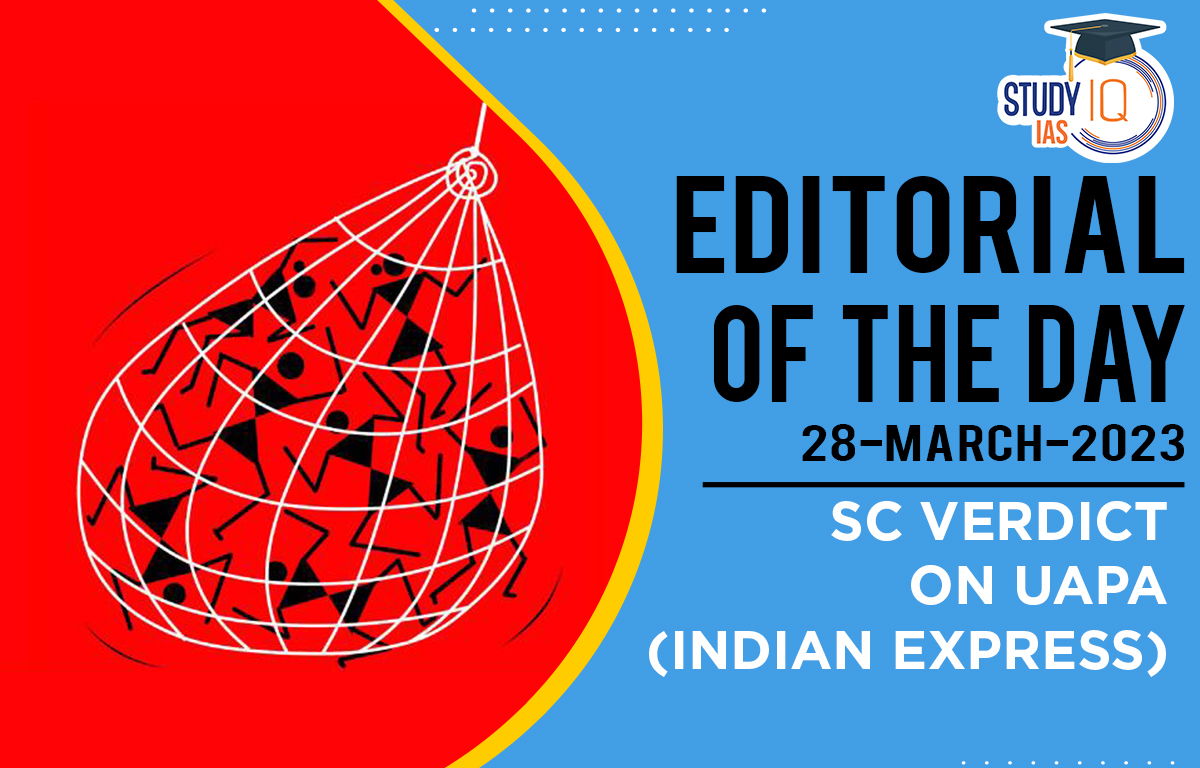Table of Contents
Context: A three-judge bench of the Supreme Court has held that mere membership of a banned association is sufficient to constitute an offence under the Unlawful Activities (Prevention) Act, 1967. This is a severe blow to principles of fundamental justice.
SC Verdict on UAPA Background
- The Constitution (Sixteenth Amendment) Act, 1963 was passed, in order to protect India’s sovereignty and integrity, giving Parliament the authority to set reasonable restrictions on the –
- freedom of speech and expression;
- right to assemble peaceably and without arms; and
- right to form associations or unions.
- The Unlawful Activities (Prevention) Act (UAPA), 1967 was passed by the Parliament to prevent organisations in India from engaging in unlawful activities.
- Section 10(a)(i) of UAPA punishes membership of unlawful organisations with imprisonment for a term which may extend to two years.
- Section 3(5) of Terrorist and Disruptive Activities (Prevention) Act (TADA), penalised membership of terrorist organisations. Section(3), TADA, is similar to Section 20, UAPA, which provides for punishment for being a member of a terrorist gang or organisation.

Decoding the Editorial
- The judgement goes against mens rea or the criminal intent:
- Unless there is a specific intent to enhance the material abilities of a terrorist or unlawful organisation, permitting the conviction of a person as a member is abhorrent to the rule of law.
- The ruling has gone beyond the pleadings made by the State:
- The Court accepted the argument by the Union government and State of Assam that Section 10(a)(i) does not require any further overt act or mens rea on the part of a member of a banned outfit. The Court has set aside the reading down of both Section 10(a)(i), UAPA, and Section(3), TADA. By doing so, it has obliterated the requirement of mens rea from both membership of an unlawful organisation and membership of a terrorist organisation and gone beyond the pleadings made by the State.
- The verdict is silent on inferring of membership of an organisation:
- Terrorist or criminal organisations are not known to keep a registry. Even in the case of a lawful entity with records of membership, it would be difficult to conclude as to who is and continues to be a member of such an association post-ban.
- The verdict has done away with the distinction between active and passive membership of proscribed organisations, which has been the basis of court rulings since 2011.
Existing Dangers with UAPA:
- The definitions of terrorist and unlawful organisations in UAPA are circular and vague.
- The Act merely states that they are organisations involved in “terrorist”/”unlawful activities” and notified as such.
- In Maoist-affected areas, the agencies have a track record of booking tribal youth.
- The semi-literate tribal youth are arrested on charges of merely possessing Maoist literature or being sympathisers of Maoist ideology.
The Supreme Court has struck down three of its previous rulings:
- Arup Bhuyan vs State of Assam: The Supreme Court ruled that “mere membership of a banned organisation will not incriminate a person unless he resorts to violence or incites people to violence or does an act intended to create disorder.”
- State of Kerala vs Raneef: In the Raneef case, the Court referred to the US Supreme Court verdicts in Scales vs United States, distinguishing “active knowing membership” and “passive, merely nominal membership”.
- Sri Indra Das vs State of Assam
Beyond the Editorial
Steps by international communities against terrorism
- United Nations Convention against Transnational Organised Crime (Organised Crime Convention)
- It is a multilateral treaty which has three Protocols (Trafficking in Persons, Smuggling of Migrants and Trafficking of Firearms) that supplement it.
- UN Global Counter Terrorism Coordination Compact
- It is an agreement between the UN Chief, 36 organisational entities, the International Criminal Police Organisation (INTERPOL) and the World Customs Organisation, to tackle the scourge of international terrorism.
- The Counterterrorism Committee (CTC)
- India hosted the United Nations Security Council’s Counter-Terrorism Committee (CTC) and the deliberation led to the “Delhi Declaration on countering the use of new and emerging technologies for terrorist purposes”.
- The Financial Action Task Force
- It is an intergovernmental organisation founded in 1989. It sets standards and promotes effective implementation of legal, regulatory and operational measures for combating money laundering, terrorist financing.
- The ‘No Money For Terror’ conference
- It is organised by Financial Intelligence Units (FIUs) of over 100 countries, jointly called The Egmont Group. India hosted its 3rd ministerial conference in Nov-2022.



 Daily Quiz 19 April 2025
Daily Quiz 19 April 2025
 Vehicle-to-Grid (V2G) Technology and its...
Vehicle-to-Grid (V2G) Technology and its...
 Waqf Act (Amendment) 2025: Key Highlight...
Waqf Act (Amendment) 2025: Key Highlight...





















